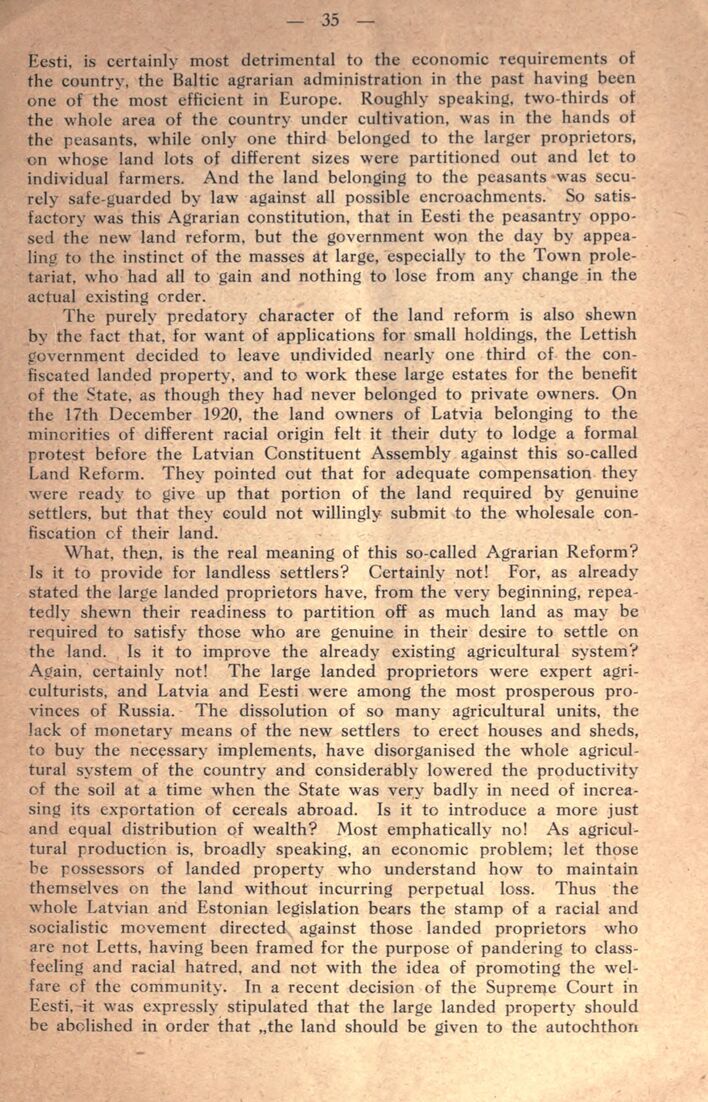
Full resolution (JPEG) - On this page / på denna sida - Chapter V. Instances of Breach of the Minorities' Rights in Latvia and Eesti

<< prev. page << föreg. sida << >> nästa sida >> next page >>
Below is the raw OCR text
from the above scanned image.
Do you see an error? Proofread the page now!
Här nedan syns maskintolkade texten från faksimilbilden ovan.
Ser du något fel? Korrekturläs sidan nu!
This page has never been proofread. / Denna sida har aldrig korrekturlästs.
35
Eesti, is certainly most detrimental to the economic requirements of
the country, the Baltic agrarian administration in the past having been
one of the most efficient in Europe. Roughly speaking, two-thirds of
the whole area of the country under cultivation, was in the hands of
the peasants, while only one third belonged to the larger proprietors,
on whose land lots of different sizes were partitioned out and let to
individual farmers. And the land belonging to the peasants was
securely safe-guarded by law against all possible encroachments. So
satisfactory was this Agrarian constitution, that in Eesti the peasantry
opposed the new land reform, but the government won the day by
appealing to the instinct of the masses at large, especially to the 1 own
proletariat, who had all to gain and nothing to lose from any change in the
actual existing order. 3m -
The purely predatory character of the land reform is also shewn
by the fact that, for want of applications for small holdings, the Lettish
government decided to leave undivided nearly one third of. the
confiscated landed property, and to work these large estates for the benefit
of the State, as though they had never belonged to private owners. On
the 17th December 1920, the land owners of Latvia belonging to the
minorities of different racial origin felt it their duty to lodge a formal
protest before the Latvian Constituent Assembly against this so-called
Land Reform. They pointed out that for adequate compensation, they
were ready to give up that portion of the land required by genuine
settlers, but that they could not willingly submit to the wholesale
confiscation of their land. ; - ^.
What, then, is the real meaning of this so-called Agrarian Reform?
Is it to provide for landless settlers? Certainly not! For, as already
stated the large landed proprietors have, from the very beginning,
repeatedly shewn their readiness to partition off as much land as may be
required to satisfy those who are genuine in their desire to settle on
the land. Is it to improve the already existing agricultural system?
Again, certainly not! The large landed proprietors were expert
agriculturists, and Latvia and Eesti were among the most prosperous
provinces of Russia. - The dissolution of so many agricultural units, the
lack of monetary means of the new settlers to erect houses and sheds,
to buy the necessary implements, have disorganised the whole
agricultural system of the country and considerably lowered the productivity
of the soil at a time when the State was very badly in need of
increasing its exportation of cereals abroad. Is it to introduce a more just
and equal distribution of wealth? Most emphatically no! As
agricultural production is, broadly speaking, an economic problem; let those
be possessors of landed property who understand how to maintain
themselves on the land without incurring perpetual loss. Thus the
whole Latvian and Estonian legislation bears the stamp of a racial and
socialistic movement directed against those landed proprietors who
are not Letts, having been framed for the purpose of pandering to
class-feeling and racial hatred, and not with the idea of promoting the
welfare cf the community. In a recent decision of the Supreme Court in
Eesti, it was expressly stipulated that the large landed property should
be abolished in order that „the land should be given to the autochthon
<< prev. page << föreg. sida << >> nästa sida >> next page >>